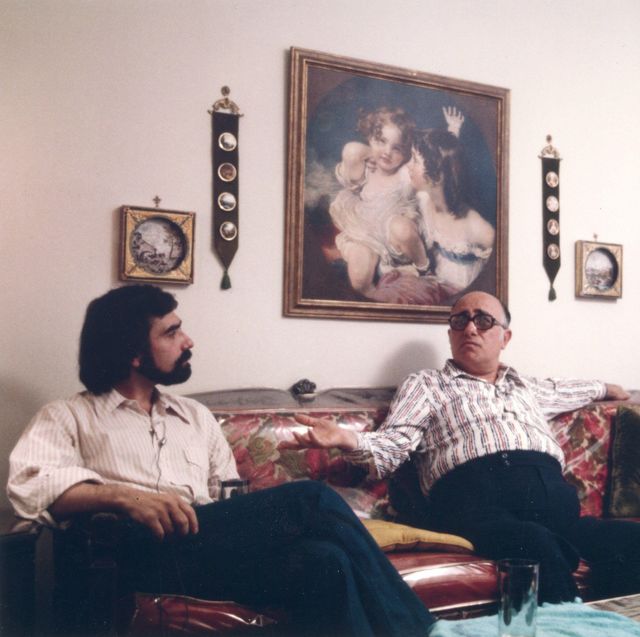Over the past seven decades, no one has explored the story of America in the 20th century quite like Martin Scorsese. The 80-year-old director's most recent films, The Irishman (2019) and Killers Of The Flower Moon, out this Friday, are big ticket affairs that ask even bigger questions about life, death and everything in-between. But 49 years ago, on the closing night of the 12th New York Film Festival in October 1974, Scorsese proved that he can pull off a small-scale masterpiece on a shoe string budget.
That screening was of ItalianAmerican, an unfiltered documentary in which the filmmaker, then in his early early thirties, spends an uneventful evening eating meatballs with his parents, Charles and Catherine. The conversation flows from religion to immigration to petty crime, family and more. In just 49 minutes, ItalianAmerican provides a microcosm of Scorsese’s main themes; here in charming and familiar domesticity, we find the cornerstone of Scorsese’s creative mission.
Catherine is just 62, Charles 61 – older people in the context of the seventies (Catherine passed away in 1997, and Charles four years before that). Sitting around the dinner table, the pair are all big-lensed glasses, chaotic crosstalk, expressive hand gestures. At one point, they simultaneously break off mid-conversation to ask Scorsese what he’s done to his tooth. “You better get it fixed up, it looks like hell,” Charles says. “It’s not long enough,” Catherine observes. Then they’re back to arguing about winemaking. Many other filmmakers would have cut this. For Scorsese, this is what he’s after: those little irrelevant distractions, those little arguments and misrememberings that make a family. We see this domestic tension – its belligerence ramped up to the nth degree – throughout his oeuvre; it’s there in Goodfellas, in Casino, in Raging Bull.
It might be a two-hander with occasional input from Scorsese, but Catherine is the undeniable star of ItalianAmerican. Amidst the noise, she holds the calm authority of the head of the house. At one point, with husband Charles talking over her, she silences him with a wave of a hand. Charles stops dead, like a puppet with its strings cut. That’s respect Henry Hill or Jordan Belfort couldn’t buy. When she’s recounting an anecdote, Catherine is a rapid-fire force of joy, sharing the same manic energy as Scorsese; there’s a sense as she speaks that something amusing is coming, and she can’t wait for you to hear it. When she’s narrating the proper way to cook meatballs we get the impression that even Paul Cicero would look up from his thinly-sliced garlic to take note. She’s also incredibly funny. “This is what my mother-in-law taught me: take a few teaspoons of tomato and throw them in there because then the meatballs remain very soft… you’re invited somewhere, you eat a meatball it’s as hard as can be. You throw it at the wall and the wall will crack.”
With such a force of personality, it’s no surprise that Scorsese didn’t just carry his mother’s influence into his films, but literally put her into ten of his pictures in small, mostly-ad-libbed roles. “All Marty does is just turn his mother on and say, ‘Action,’” says Thelma Schoonmaker, the legendary editor who has worked alongside Scorsese for five decades. “The only direction he gave her was ‘Pick up the painting, mother,’ and then she improvised those great lines,” Schoonmaker says of Goodfellas' famous dinner scene. “I thought of that all myself,” Catherine says proudly of a long, improvised scene in The King Of Comedy. According to Scorsese, his mother is the only person he’s seen make De Niro laugh while filming.
ItalianAmerican is a treat to behold. One that sheds light on Scorsese’s influences, but also has the power to make the viewer sentimental for their own family life. It’s also made abundantly clear just how much his late mother means to him. At the end, while his father tells a story, the camera holds tight on Catherine’s face before freezing on a black and white snapshot of her. “Now that’s enough for today, Marty!” she declares in the next frame, springing up from the table. “Now, listen, could I put my furniture back?… Is he still taking this? I’ll murder you! You won’t get out of this house alive!” she warns, as vital, as vibrant, as quietly commanding as the very best of her son’s films.

Tom Ward is a freelance writer and author. He is a winner of the GQ Norman Mailer Award and a PPA Award. Find him at tomwardwrites.com













